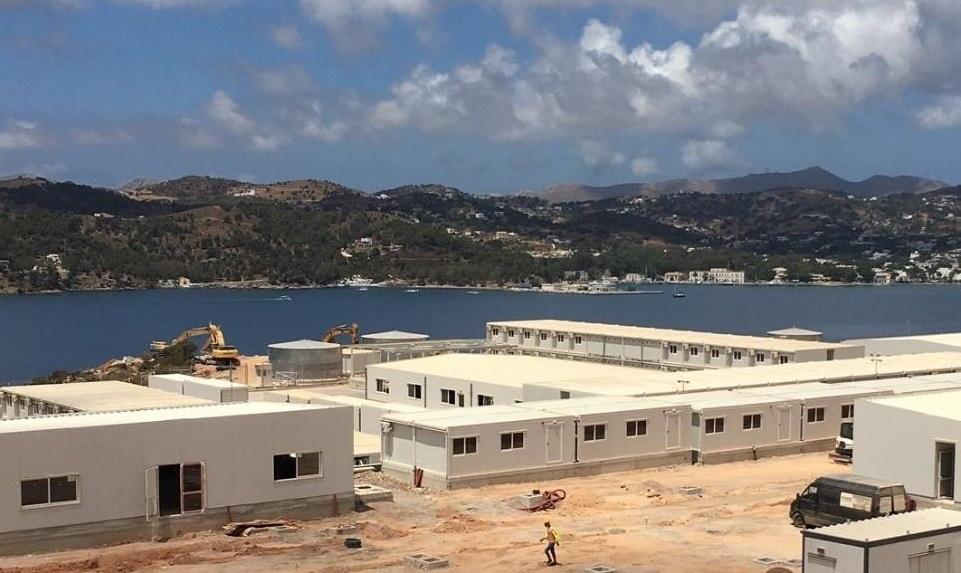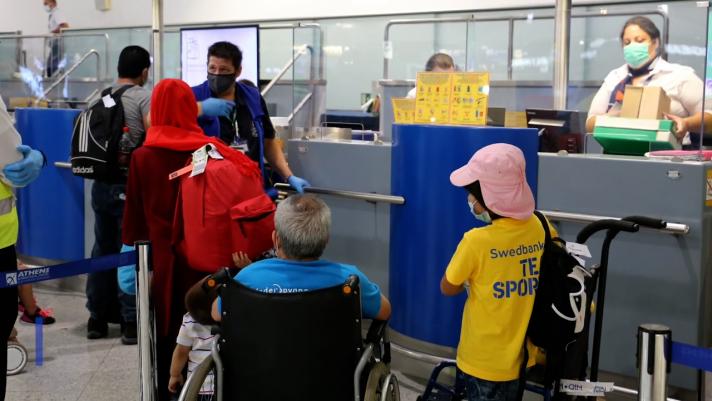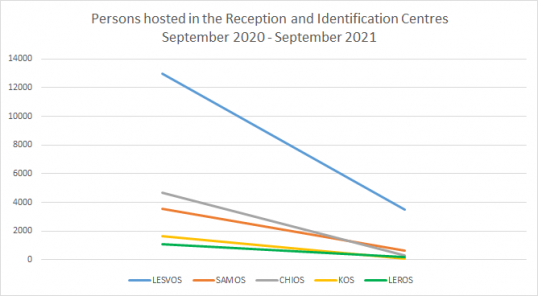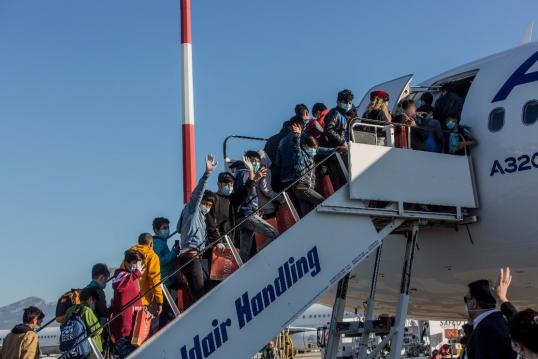
Just over a year ago, on 8 and 9 September 2020, the reception facility in Moria, Lesvos, which hosted migrants and refugees since 2015 under difficult conditions, was completely destroyed by a fire.
The event triggered a need for immediate humanitarian response, and to end overcrowding and poor conditions in Reception and Identification Centres in the Eastern Aegean islands. For that purpose, in September 2020 the European Commission set up a dedicated Task Force to boost close cooperation with the Greek authorities and EU Agencies.
Conditions before the fire
At the time of the fires on Lesvos, facilities on the islands of Lesvos and Samos were severely overcrowded. On Lesvos, Samos and Chios, informal settlements existed next to the official reception centres where people lived in makeshift tents. Overpopulation caused a heavy strain on the official facilities.
A significant number of those hosted had been on the islands for a long time. They were waiting for their asylum application to be processed before being able to travel onwards to mainland Greece, being relocated to another Member State, or returning to their countries of origin or to Turkey under the EU-Turkey Statement.
Relocation of 4,162 people
Following the extensive efforts of the organisations involved, and the solidarity of EU Member States with the support of the European Commission, to this day (9 September 2021) 4,162 persons have been relocated to other EU Member States. These include: unaccompanied children and teenagers, vulnerable asylum seekers and their families, and beneficiaries of international protection. Between February and March 2021, 773 persons were even directly relocated from Lesvos to Germany via direct flights, thus contributing to reduce overcrowding in the temporary facility.
These efforts coupled with a 60% decrease in arrivals in the first seven months of 2021 compared to 2020 and intensive efforts to address overcrowding (including the transfer of more than 18,500 people from the islands to the mainland) means that the number of people on the Eastern Aegean islands stands at 5,066 as of early September 2021 compared to 21,546 in September 2020.
Reducing the backlog of asylum applications
In addition to efforts to address overcrowding, it was crucial to improve the efficiency of the asylum and return procedures, and to develop better integration measures for new arrivals.
With the support of the European Asylum Support Office (EASO), the Greek Asylum Service processed 71,782 asylum cases and registered 32,083 applications between June 2020 and June 2021. As of end of June 2021, the backlog of cases at first and second instance had been decreased by 40% compared to the same period last year.
Integration of recognised refugees
Recognised beneficiaries of international protection on Lesvos were transferred to the mainland and their integration into Greek society, often supported through the EU-funded HELIOS programme. With 32,611 persons benefitting from the scheme so far, and 13,575 signing up since September 2020, the HELIOS programme supports people to create a new life and home for themselves. It supports:
- independent accommodation,
- integration courses,
- language classes and employability support.
Assisting migrants who opt for voluntary return
With EU support, the Assisted voluntary return and reintegration programme is also promoted to offer administrative, logistical and financial support, including reintegration assistance, to people unable or unwilling to remain in the host country, who volunteer to return to their countries of origin. Between September 2020 and June 2021, 2,508 people returned under this EU funded programme.
A new life for unaccompanied children and teenagers
Significant steps have been taken for the protection of unaccompanied children and teenagers. Relocation efforts have contributed significantly to the reduction of the number of unaccompanied children and teenagers on the islands, which stands at 2,738, far below the 4,222 unaccompanied children and teenagers that were present in Greece in September 2020. At the same time, through EU financial support, the number of places in long term accommodation solutions such as shelters and Semi-Independent Living (SILs) apartments has risen to 2,209 compared to 1,797 one year ago.
New reception centres
While significant progress has been made already, the Commission and EU Agencies are working closely with the Greek authorities to continue making necessary improvements to streamline processes and enhance capacities, including for the return of persons who do not have the right to stay in the EU.
The establishment of the new Reception and Identification Centre on Lesvos is a key priority of the Commission’s Taskforce on Migration Management. The Commission together with the Greek authorities and EU agencies works to proceed with the construction of the new centre, as well as consulting with the local communities. On Samos, Kos and Leros, new structures have been constructed over the last months. With most works completed, the new Samos centre will open its doors on 18 September 2021. The tender procedure to select a construction contractor for Lesvos and Chios is well advanced; works will also start there once the contract is awarded.
In the meantime, the living conditions in the temporary facility on Lesvos have improved since the first residents moved there last September. 200 accommodation containers and some 120 Refugee Housing Units have been installed to increasingly replace the accommodation in tents. The works to establish a proper water grid, sewage system and the setting up of containerised showers and toilets for the whole camp will soon be finished. Since December, some 150 hot water showers have been functioning, providing adequate access to washing and hygiene. However, until now the 400 toilets are still chemical toilets, being cleaned twice a day. In addition, due to the ongoing building works to improve the camp, there is noise, dust and roads are only gravelled. While all children in the camp follow non-formal education activities, only a few children have access to formal education, and the health services provided have only a limited capacity concerning mental health issues. There are also strict limits on residents’ ability to leave and enter the camp, which according to the Greek authorities are necessary measures to address COVID-19 risks. The Commission continues to work with the Greek authorities to improve the situation.
Details
- Publication date
- 9 September 2021



